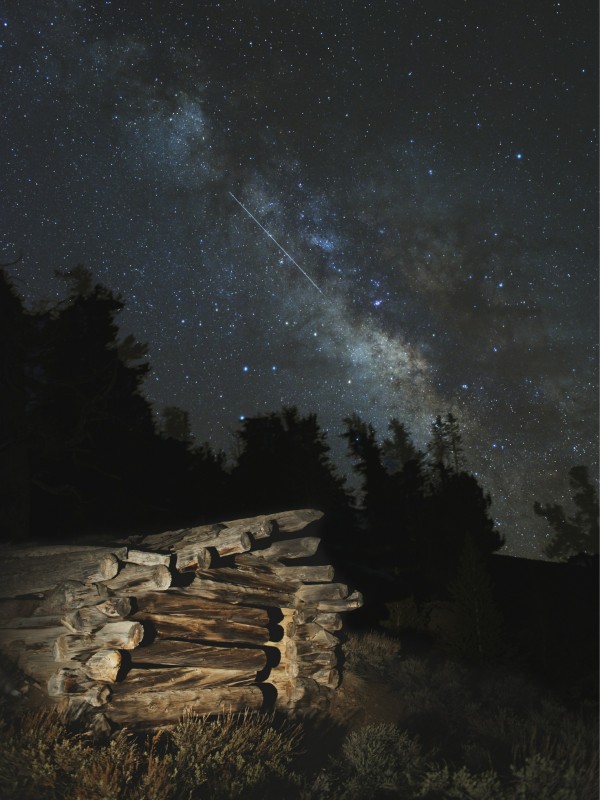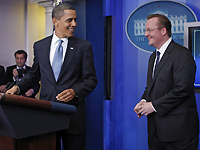Welcome to ...
Windmills Tilted, Scared Cows Butchered, Lies Skewered on the Lance of Reality ... or something to that effect.
Friday, May 1, 2009
Astronomy Picture of the Day

Credit & Copyright: Tony Rowell / Astrophotostore.com
Your unlikely ancestors
 We know very little about the origins of complex animal life, but there are hints that it all began with sponges that refused to grow up.
We know very little about the origins of complex animal life, but there are hints that it all began with sponges that refused to grow up.Sponge larvae: Your unlikely ancestors
Science News
Nearby asteroid found orbiting sun backwards
For super-tough spider silk, just add titanium
Churchgoers more likely to support torture
The more often Americans go to church, the more likely they are to support the torture of suspected terrorists, according to a new survey.
More than half of people who attend services at least once a week — 54 percent — said the use of torture against suspected terrorists is “often” or “sometimes” justified. Only 42 percent of people who “seldom or never” go to services agreed, according to the analysis released Wednesday by the Pew Forum on Religion & Public Life.
White evangelical Protestants were the religious group most likely to say torture is often or sometimes justified — more than six in 10 supported it. People unaffiliated with any religious organization were least likely to back it. Only four in 10 of them did.
Support for terror suspect torture differs among the faithful
Killer cleaned murder weapon in dishwasher
N.Y. bounty hunter ran down suspect in vehicle chase
Toms River police charged a New York bounty hunter with aggravated assault after he ran down the subject he was after.
Lawn mower saves man from exploding grenade
A Croatian man cutting his grass was saved by his lawn mower when it ran over and exploded a hand grenade.
FDA warns dieters to stop taking popular drug
 The government warning about Hydroxycut comes after reports of liver damage and at least one death.
The government warning about Hydroxycut comes after reports of liver damage and at least one death.FDA warns dieters
Also:
Obama 'crashes' press briefing
Six Mysteries About The Swine Flu
 These unanswered questions linger about the flu outbreak that has infected more than 100 in the U.S.
These unanswered questions linger about the flu outbreak that has infected more than 100 in the U.S.6 mysteries about the swine flu
Also:
Taliban threaten attacks over U.S. surge
A Taliban leader has instructed fighters in Afghanistan to target U.S. and other coalition troops in response to the United States sending more troops into the war.
First edition of Darwin's landmark book up for sale
A British auction house says it is offering Darwin fans a chance to buy a first edition of the famed naturalist's groundbreaking book.
Hitler back in Berlin ...
Adolf Hitler is coming back to Berlin.
More than six decades after the Nazi dictator killed himself in his Berlin bunker, a character parodying Hitler will feature in the first production in Germany of the award-winning Broadway musical comedy by Mel Brooks, "The Producers."
Stanford dorm resident gets Condi Rice riled up
It was supposed to be a nice, stress-free visit to her alma mater Stanford University, but Condoleezza Rice instead ended up in the middle of a heated exchange with a student over the issue of torture – and it was all caught on tape.
In the clip, the former Secretary of State under the shrub attended a reception at one of the dorms on Monday when a student approached her with questions about authorizing the use of torture.
Connecticut Senate OKs Machine Gun Ban for Kids
On Thursday, the Connecticut Senate OKed a measure which would ban allowing children under 16 years old to handle or shoot machine guns.
This stems from the tragic death of eight-year-old Christopher Bizilj, who accidentally shot himself to death after losing control of a Uzi submachine gun at a gun fair.
Graffiti-busting volunteers paint over art
A British man said volunteers clearing graffiti inadvertently painted over a work by street artist Banksy that he was planning to sell for nearly $7,400.
Woman steals 500 lbs of gold, piece by piece, over 6 years
A New York woman swiped 500 pounds of gold belonging to Jacmel Jewelry by stashing small pieces in her handbag with a false bottom over six years. .
Dead mom 'found lying in litres of feces'
A woman has been charged with negligent manslaughter after her mother's allegedly maggot-infested body was found lying in a pile of feces.
'Alien skull' spotted on Mars
UFO spotters are claiming they have spotted an alien skull on Mars after NASA beamed back satellite images from the planet.
Saudi Arabia clamps down on unlicensed female gyms
"Let her get fat!" is the slogan women in Saudi Arabia are using to challenge a clampdown on female-only gyms.
Rude surprise for millions of taxpayers
 Some people who are enjoying President Obama's tax credit will need to return some of it.
Some people who are enjoying President Obama's tax credit will need to return some of it.Rude surprise
Also:
Justice David Souter and the First Amendment
 Justice David Hackett Souter — a man who rose from relative national obscurity in New Hampshire to become a U.S. Supreme Court justice — has made his mark in many areas of First Amendment jurisprudence. The Harvard Law School graduate and Rhodes scholar, who replaced Justice William Brennan on the high court and is now poised to retire himself, has penned key opinions in the areas of the establishment clause, campaign finance, secondary effects, freedom of association, public employee speech and more.
Justice David Hackett Souter — a man who rose from relative national obscurity in New Hampshire to become a U.S. Supreme Court justice — has made his mark in many areas of First Amendment jurisprudence. The Harvard Law School graduate and Rhodes scholar, who replaced Justice William Brennan on the high court and is now poised to retire himself, has penned key opinions in the areas of the establishment clause, campaign finance, secondary effects, freedom of association, public employee speech and more.Establishment clause:
Souter has been prolific in writing opinions about the first 10 words of the First Amendment — “Congress shall make no law respecting an establishment of religion.” He believes that the clause erects a fairly high wall of separation between church and state. Souter dissented in Rosenberger v. Rector & Visitors of the University of Virginia (1995), a case in which the 5-4 majority ruled that a public university committed viewpoint discrimination in refusing to fund a student Christian publication. The majority viewed the decision as a classic form of viewpoint discrimination by subjecting certain religious speech to second-class treatment. However, Souter saw the case much differently, writing: “The Court today, for the first time, approves direct funding of core religious activities by an arm of the State. … Using public funds for the direct subsidization of preaching the word is categorically forbidden under the Establishment Clause, and if the Clause was meant to accomplish nothing else, it was meant to bar this use of public money.”
Souter also dissented in the Court’s sharply divided ruling Zelman v. Simmons-Harris (2002), in which the Court upheld by a 5-4 vote an Ohio school-voucher program designed as an alternative to Cleveland’s failing public schools. “The record indicates that the schools are failing to serve their objective, and the vouchers in issue here are said to be needed to provide adequate alternatives to them,” Souter wrote. “If there were an excuse for giving short shrift to the Establishment Clause, it would probably apply here. But there is no excuse. Constitutional limitations are placed on government to preserve constitutional values in hard cases, like these.” He even accused the majority of “overruling Everson” — the Court’s landmark 1947 decision in Everson v. Board of Education, in which the Court extended the establishment clause to state and local governments and explained the central meaning of the provision. In Everson, Justice Hugo Black wrote that the wall of separation between church of state “must be kept high and impregnable.”
Dissents aren’t the only opinions Souter has written in establishment-clause cases. He authored the Court’s main opinion in McCreary County v. American Civil Liberties Union (2005), which found that Ten Commandments displays in two Kentucky courthouses violated the principle of church-state separation. “This is no time to deny the prudence of understanding the Establishment Clause to require the government to stay neutral on religious belief, which is reserved for the conscience of the individual,” he wrote.
Earlier this year, Souter wrote a concurring opinion in Summum v. Pleasant View, a case involving whether a city in Utah must accept a religious group’s monument for placement in a public park. The case came to the Court as one about the government-speech doctrine, not as an establishment-clause case. But Souter recognized that the Court must eventually reconcile the government-speech doctrine and the principle of church-state separation, writing: “It is simply unclear how the relatively new category of government speech will relate to the more traditional categories of Establishment Clause analysis.”
Robert O’Neil, founder of the Thomas Jefferson Center for the Protection of Free Expression, says that Souter sees himself as a guardian of religious freedom. “During his confirmation hearings, he made statements about separation of church and state that were quite at variance” with conventional conservative interpretation of religious-liberty principles.
Campaign finance:
One of the more interesting areas of First Amendment jurisprudence concerns what limits Congress can place on campaign finance. Supporters of regulation contend limits are necessary to prevent corruption or the appearance of corruption. Detractors contend that regulation of campaign contributions and spending infringe on political free-speech rights. Justice Souter authored several opinions in this area of First Amendment law, generally supporting limits on political contributions.
Souter wrote the Court’s opinion in Nixon v. Shrink Missouri Government (2000), in which the majority upheld Missouri’s limits on political contributions in state races. More generally, Souter has approved of the Court’s differential treatment of political contributions from campaign spending that have occurred since the landmark Buckley v. Valeo (1976) decision. In his majority opinion in Shrink, Souter contended that the test for whether a limit on political contributions was constitutional was “whether the contribution limitation was so radical in effect as to render political association ineffective, drive the sound of a candidate's voice below the level of notice, and render contributions pointless.”
He wrote a dissenting opinion in Randall v. Sorrell (2006), in which the Court struck down campaign-finance restrictions in Vermont. Though the state had relatively low contribution limits, Souter believed they did not violate the First Amendment. “To place Vermont's contribution limits beyond the constitutional pale, therefore, is to forget not only the facts of Shrink, but also our self-admonition against second-guessing legislative judgments about the risk of corruption to which contribution limits have to be fitted.”
Secondary-effects doctrine:
Souter also played a key role in the development and expansion of the secondary-effects doctrine. In a concurring opinion in Barnes v. Glen Theatre (1991), Souter reasoned that government officials could regulate nude dancing because of the harmful, secondary effects associated with such expression — such as increased crime and decreased property values. Souter’s opinion extended the doctrine from its traditional application in land-use zoning cases to direct regulations on the content of erotic expression. Souter’s concurrence became the model for municipalities across the country, which sought to justify restrictions on adult entertainment not on moral grounds but on the secondary-effects doctrine.
Nearly 10 years later in City of Erie v. PAP’s A.M. (2000), Souter wrote a dissenting opinion in which he retracted his earlier position to a certain extent: “I may not be less ignorant of nude dancing than I was nine years ago, but after many subsequent occasions to think further about the needs of the First Amendment, I have come to believe that a government must toe the mark more carefully than I first insisted. I hope it is enlightenment on my part, and acceptable even if a little late.”
Other areas of First Amendment jurisprudence:
Souter wrote opinions in many other areas of First Amendment law. He dissented from the Court’s ruling in Garcetti v. Ceballos (2006), in which the majority of the Court limited public-employee speech by eliminating protection for speech made pursuant to official job duties. Souter disagreed, finding “there is no good reason for categorically discounting a speaker's interest in commenting on a matter of public concern just because the government employs him.”
Souter also wrote in the area of freedom of association. He authored the opinion for a unanimous Court in Hurley v. Irish-American Gay, Lesbian and Bi-Sexual Group of Boston (1995), in which the justices recognized the First Amendment rights of parade organizers to exclude groups with a different message. “Disapproval of a private speaker’s statement does not legitimize use of the Commonwealth’s power to compel the speaker to alter the message by including ones more acceptable to others,” he wrote. However, Souter dissented in Boy Scouts of America v. Dale (2000) when the Court ruled that the Boy Scouts had a First Amendment right to exclude an assistant leader because of his sexual orientation.
Perhaps the starkest evidence of Souter’s commitment to First Amendment principles came in his solitary dissent in National Endowment for the Arts v. Finley (1998) in which the Court rejected a First Amendment challenge to a federal law requiring that the NEA take into account “general standards of respect and decency” before awarding grants to artists. “He insisted upon scrupulous application of the doctrine of unconstitutional conditions in First Amendment rights,” said O’Neil. “That is why he took that lone position in NEA v. Finley with respect to federal grants to individual artists.”
“He was a worthy successor to Brennan in the First Amendment area,” O’Neil says. “He carried that mantle quite effectively and consistently.”
Our Readers
Peterborough, England, United Kingdom
Tel Aviv, Tel Aviv, Israel
Paris, Ile-De-France, France
Manchester, England, United Kingdom
Surabaya, Jawa Timur, Indonesia
Unna, Nordrhein-Westfalen, Germany
Prague, Hlavni Mesto Praha, Czech Republic
Edinburgh, Scotland, United Kingdom
Balikpapan, Kalimantan Timur, Indonesia
Morlaix, Bretagne, France
London, England, United Kingdom
Tunapuna, Saint George, Trinidad and Tobago
Sheffield, England, United Knigdom
Oslo, Oslo, Norway
Goderich, Ontario, Canada
Tehran, Esfahan, Iran
Cardiff, Wales, United Kingdom
Ramat Gan, Tel Aviv, Israel
Solina, Stockholms Lan, Sweden
Aberdeen, Scotland, United Kingdom
Nottingham, England, United kingdom
Raipur, Chhattisgarh, India
Kosice, Kosice, Slovakia
Perpignan, Languedoc-Roussillon, France
Dreieich, Hessen, Germany
Bhubaneswar, Orissa, India
Williams Lake, British Columbia, Canada
Preston, England, United Kingdom
Istanbul, Istanbul, Turkey
Toronto, Ontario, Canada
Havana, Havana, Cuba
Hasselt, Limburg. Belgium
Osnabruck, Niedersachen, Germany
as well as Northern Ireland, Romania and the United States
Daily Horoscope
You can't be friends with everyone in life.
True - only the ones who deserve it.




